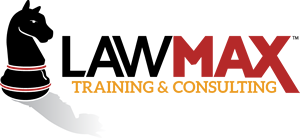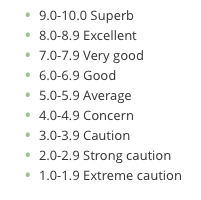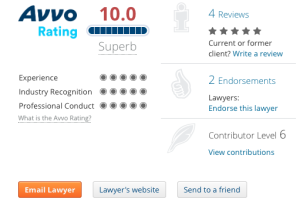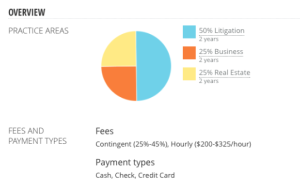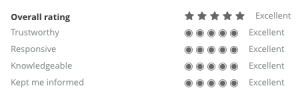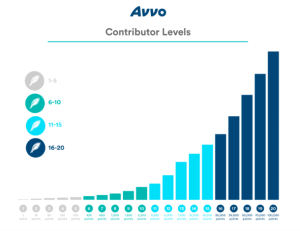When people are searching for lawyers, the first tool they turn to is the internet. Potential clients who need your help are out there searching, and in order to capture this audience, you must have a clean, accurate, online presence.
One tool created by a tech-savvy lawyer out of Seattle, Washington is Avvo. Avvo is a web-based search engine for lawyers and legal advice that allows users to locate lawyers based on their geographic location and practice area.
How Avvo Ratings Work
Avvo uses a 10-star rating system based on lawyers’ backgrounds as well as information that is input into the site. Ratings are calculated using a mathematical model based on profile information. This information includes years of practice, disciplinary history, professional achievements, and industry recognition.
Avvo will also automatically collect and evaluate background data on a lawyer based on other online information. Information is pulled from state bar associations, court records, public records, and other legal sites.
To calculate a profile rating, different weights are assigned to the profile information. However, Avvo does not specify how the information is rated in order to keep people from gaming the system. To earn a high profile score, filling out each section accurately and in-depth is essential.
Other main components that affect ratings are client reviews, peer endorsements, and overall contribution to the website.
Profile Overview
A picture, overall rating, and a snapshot of client reviews, endorsements, and contributor level is the first thing seen on an Avvo profile. Practice areas, fees and payment types, contact information, languages spoken, About Me information, and links to social media directly follow.
Practice Areas is a section where it is easy to run into issues. Attorneys who have diversity within their practice areas and choose to claim all areas have a harder time with industry recognition. The majority of 10.0 profiles have practice areas that support each other.
The About Me section allows attorneys to put a personalized touch on profiles and talk about experiences that are relevant to their areas of legal practice.
Linking to your firm’s website and personal social media sites is recommended. Likely you will gain followers and clients are able to gather more information.
When creating a 10.0 profile, sometimes having a complete profile doesn’t matter, but if components are missing, smaller details like having relevant practice areas start to matter.
Practice Areas
The References section follows the profile overview and includes client reviews and peer endorsements.
Client Reviews
Client reviews are an essential part of creating a 10.0 profile. Past, present, and sometimes potential clients who have received a consultation are all eligible to leave feedback on their experiences.
It is recommended to have 10-12 reviews. Positive reviews will not increase your Avvo rating, but it will help maintain a positive image. Negative reviews are never good, but as long as they are less than 10% of all your reviews they will not be too impactful. No one expects you to get 100% on client reviews.
Client reviews are looked over by an Avvo moderator before they are posted to ensure it meets the site’s community guidelines. A good review should be a detailed personal experience to help readers make an informed decision.
Peer Endorsements
Peer endorsements are best accrued on a regular basis at a recommended rate of one per month. If you don’t have any, start asking around!
When you request endorsements, remind the peer of the working relationship you have established and what it entails to help them give you a more valid review. Prompting peers reminds them what the relationship was based on.
When endorsing a peer, be as detailed as possible and always share good information. Never just state “I endorse this lawyer.” This is a common, overused, and essentially useless endorsement.
Resume
The resume section includes license, personal misconduct, work experience, education, awards, and associations. Make sure this section is filled out so you receive credibility for the things you have accomplished. Updating this section on a regular basis will also increase your credibility.
Include all the awards you have received and any associations you are affiliated with. Being a member of the state bar is often not enough, start joining committees to increase experience and recognition and boost your involvement in the legal industry.
Include when you were part of the Young Lawyers Division and your current state bar. If you are a woman, look at becoming a member of women’s law groups. It is recommended to be involved in at least 1 or 2 trade organizations or local committees. Even if you are a member but not currently active, include this in your profile.
Portfolio
The portfolio is the most important, and oftentimes most neglected, section of an Avvo profile. Contributions, cases, publications, and speaking engagements are all part of this section.
Contributing to the site helps you build your reputation and also earn a higher ranking on Avvo. There are various ways to contribute: answering questions, publishing helpful guides, and evaluating the contribution of your peers. Overall, the more actively you participate, the more opportunity you have to engage with potential clients.
Avvo ranks contribution on a scale from 1-20. There are three different types of points that all count towards your contribution score: Contribution, Quality, and Showcase.
Contribution Points
Contribution points are earned by answering questions in the Q&A Forum, writing helpful guides, and agreeing and commenting on other lawyers’ answers.
Quality Points
Quality Points encourage users to publish quality content on Avvo. Users are able to acknowledge when content is helpful, making these some of the easiest points to earn.
Showcase Points
Showcase Points are earned when users share helpful content outside of Avvo. There are various outlets you can share content on to earn showcase points.
Contributing to the website can increase your rating drastically. Start spending 10 minutes a week reviewing questions, answering them, or agreeing with others’ feedback. Making this part of your weekly routine will be beneficial in the long run.
Publications
Include at least one or two publications complete with the article, title, and year. If you have never been published before, take a look at what your local bar wants and start by getting published through them. Industry publications, Attorney at Law Magazine, or local newspapers are other options. Remember, you can’t publish online yourself.
Speaking Engagements
Speaking engagements can be for a local trade organization, a local networking event, or even at your state bar. Include any speaking events as it relates to the legal industry. Provide the presentation name, conference or event, and the date.
Conclusion
Potential clients are searching for lawyers online. When someone is referred to a lawyer, clients are still looking for personal feedback and information online before hiring.
Avvo is a great search engine for potential clients to search geographically for information, qualifications, previous work, and feedback on lawyers. Like Google, the majority of people searching are only going to review the first couple of pages, making having a high rating very important.
To achieve a 10.0 profile, you need information in every section relevant to your practice areas. Having a consistent, complete Avvo profile with quality reviews and contribution points will guarantee you a good ranking. Paying attention to the details of each section will help you stand out from your local competition on Avvo and on other search engine sites.
For more information on Avvo, visit www.avvo.com/support.
